-
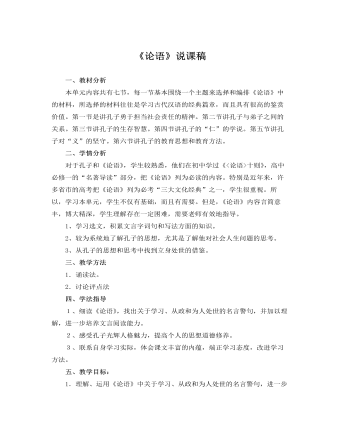
人教版高中语文必修1《论语》说课稿
三、文本中的句子解决完毕,大家对文本内容的理解更加深入了。请速度文本,思考:《论语》具体涉及了哪些方面的内容,体现了孔子什么观点?明确:主要有治学、从政、修身养性和交友治道等方面,体现了孔子“克己复礼”的思想。四、 教师引导学生讨论: 如何评价孔子的言行和观点?从古至今人们对孔子有哪些评价?明确:1、春秋战国时代, 孔子门人及其后学者均推尊孔子。门人中以子贡为代表,他对孔子赞美备至,奉如天人,把孔子比拟为高天、日月、木铎,凡人是永远不可企及的,认为孔子是天生的圣人,“仰之弥高,钻之弥坚”。亚圣孟子认为孔子所行的“圣人之道”是遍及自然界和社会的至高准则。然而当时民间一般看法认为孔子是博学成名的大学者。

在州委文化旅游工作委员会议上的讲话范文
第一,要抢抓文旅发展难得机遇。要抢抓有序放开跨省旅游机遇,今年*月底,国家文化和旅游部制定印发了《关于加强疫情防控科学精准实施跨省旅游“熔断”机制的通知》,将跨省团队旅游“熔断”区域进一步精准到县(区)域,我们要抓住机遇,全力恢复旅行社及在线旅游企业的跨省团队旅游及“机票+酒店”业务,促进旅游市场快速复苏回暖。要抢抓成功举办旅发大会扩大影响机遇,突出抓好*条旅游精品线路、节庆活动、旅游产品等培育。上半年,我们推出了“*人游*”活动,全州*家景区免门票一个月,效果很好,还要继续开展。要抢抓暑期学生旅游高峰期和全省干部职工*月份集中休年假机遇,学习借鉴其他地区的经验做法,研究具体“引客入州”政策措施,点燃*旅游市场。 第二,要及时兑现旅游纾困政策。上半年,国省州针对文旅行业恢复发展出台了系列政策措施,今年州里已安排旅游纾困专项资金,各相关部门要认真梳理,兑现落实国家、省州出台的系列帮扶政策。要加强上级专项资金申报,力争获得更多国省政策支持。要盘点评估现有政策落实情况,进一步摸排受疫情影响较大的餐饮、住宿、交通运输、文化旅游等服务业企业名单,专项制定帮扶措施,帮助困难企业渡过难关。要强化部门联动,结合干部联企“送政策、解难题、优服务”和“银行行长进园区”活动,提高政策直达性、扩大受益面,确保惠企政策精准直达快享,助推文旅产业加快复苏发展。 第三,要精准组织开展市场营销。作为首届湖南旅游发展大会的系列活动,近期,*驻华外交官“发现中国之旅”走进*州,*的美景和文化给他们留下了非常深刻印象,来自朝鲜、泰国等*个国家的*位驻华外交官及代表对*文旅纷纷点赞,希望以后有机会还能再来。要抢抓全省旅发大会宣传热度,开展好神秘*“盲盒”快闪,旅游线路评选等州旅发大会会后活动和“周游三湘 就来*”推广活动。要组织客源市场营销“小分队”,在长沙、广州等重点客源城市开展精准营销,与重庆、湖北、广东等地洽谈合作细节。鼓励各县市区围绕旅发大会、暑期旅游市场策划各类营销活动,办好湖南省夏季乡村旅游节、*旅拍节第节庆活动,营造浓厚宣传营销氛围。要树立全州“一盘棋”思想,强化整体形象包装,建立健全全州旅游宣传互推、智慧旅游、旅游通达、零客互推、利益共享等保障机制,改变过去各县市区文旅宣传互推“各自为政”力量分散的现状,加快构建旅游联动发展大格局。同时,要加大文化旅游资源整合,加快组建州级文化旅游投资集团公司,加大文旅龙头企业引进和培育力度,支持文旅企业参与市场竞争、不断做大做强。
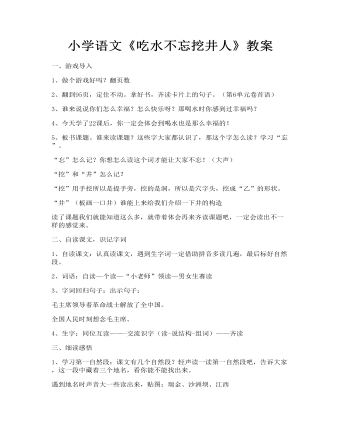
小学语文《吃水不忘挖井人》教案
4、今天学了22课后,你一定会体会到喝水也是那么幸福的!5、板书课题。谁来读课题?这些字大家都认识了,那这个字怎么读?学习“忘”。“忘”怎么记?你想怎么读这个词才能让大家不忘!(大声)“挖”和“井”怎么记?“挖”用手挖所以是提手旁,挖的是洞,所以是穴字头,挖成“乙”的形状。“井”(板画一口井)谁能上来给我们介绍一下井的构造读了课题我们就能知道这么多,就带着体会再来齐读课题吧,一定会读出不一样的感觉来。
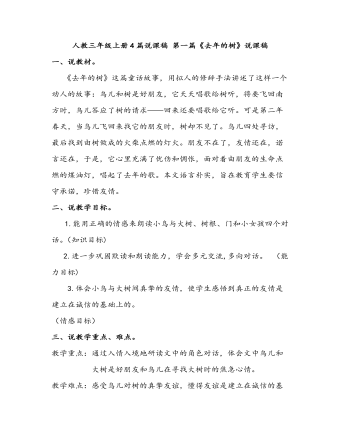
人教版三年级上册语文说课稿
二、说教学目标。 1.能用正确的情感来朗读小鸟与大树、树根、门和小女孩四个对话。(知识目标) 2.进一步巩固默读和朗读能力,学会多元交流,多向对话。 (能力目标) 3.体会小鸟与大树间真挚的友情,使学生感悟到真正的友情是建立在诚信的基础上的。

2023年上半年安全生产工作总结、存在问题及下半年工作计划
一、2023年上半年安全生产工作开展情况(一)全旗安全生产形势截至目前,我旗发生2起一般生产安全事故,死亡2人,非煤矿山、危险化学品、烟花爆竹、金属冶炼等重点行业领域未发生生产安全事故,全旗安全生产总体形势较为平稳。(二)各重点行业领域安全生产隐患排查情况我旗全面开展对危险化学品、非煤矿山、烟花爆竹、冶金工贸等重点行业领域生产经营单位安全生产隐患排查治理和重点领域专项整治,各项检查21次,先后检查各类生产经营单位(企业)68家次,共发现安全隐患231条,现已全部整改完成,安全生产行政处罚16家,罚款28.7万元。(三)安全生产专项整治三年行动工作开展情况持续深入开展全旗安全生产专项整治三年行动集中攻坚行动,认真对照任务清单,建立健全隐患排查制度,调动各行业主管部门力量,逐条逐项推进专项整治工作,深入分析安全生产共性问题和突出隐患,及时动态更新“四个清单”。截至目前,各专项领域共排查企业1914家次,排查隐患732处,已整改649处,整改率89%。各部门成立联合检查组64次,督导检查单位505家,警示约谈72家;以三年整治行动为契机,继续强化我旗安全生产薄弱环节,确保全旗安全生产形势持续稳定向好。

青年文明号事迹材料(近三年总结)
三、服务群众,提质增效一是主动作为,助力优化营商环境。青年干部认真落实企业诉求快速响应机制,并在老组员的指导下精准及时响应平台内的企业诉求,并提供解疑释惑的贴心服务,为优化我市营商环境舔砖加瓦。另一方面青年干部主动担起“推广大使”职责,积极推广商事登记全程“网上办”、“AAA智能办”、执照智能审批、执照快递上门等服务内容,并通过线上网办咨询与办事大厅线下服务有机结合,耐心指导群众办事实现“免预约”“全天候”“不见面审批”,以数据的多跑路切实减少了群众的少跑腿,青年干部以实际行动推动数字政府建设不断深化。二是强化监管,确保食品安全落实到位。在老组员的带领下,青年干部积极深入开展食品监督抽检1564批次,并参与创建国家食品安全示范城市工作,通过定制并不断更新市食品安全“两个责任”落实信息公开栏,专门印发“两个手册”(《包保干部工作手册》和《企业落实食品安全主体责任工作手册》),落实食品安全“两个责任”,并推动完成创建广东省食品安全示范县验收工作。

大班语言教案:城市老鼠和乡村老鼠 大班语言综合活动
一、活动目标1、欣赏图片,感受城市、乡村各具特色的美景和生活。2、在辩论活动中了解城市和农村的不同生活方式,懂得适合自己的才是最好的。二、 活动准备:1、事先安排幼儿参观城市或者乡村,布置主题墙面的城市和乡村的图片。2、情景童话剧表演,布置场地。3、动画制作。4、城市和乡村的图片若干张

中班语言课件教案:鼠宝宝学外语
2. 理解词:眉开眼笑、调皮。3. 在欣赏、分析过程中感受故事的幽默、诙谐。重点:要求理解鼠妈妈教鼠宝宝学外语的原因。难点:鼠宝宝从不愿学的动态表现到肯学的思想转变过程。环境创设、材料准备:图片设计思路:这个故事生动有趣,诙谐幽默,能激起幼儿的学习兴趣。一开始以照片的形式出现,吸引了幼儿的注意力,让幼儿加深了对鼠宝宝一家的喜爱之情。接着一系列的提问,例:“第二个生的叫什么?”发展了幼儿 <BR><P></P>的想象力和发展性思维能力,接着引导幼儿进入下一环节,当故事将到一半时停止讲述,给幼儿留下了遐想的空间,让幼儿运用已有的知识经验来理解“外语”一词,通过悬念式的提问,激发幼儿的好奇性心和学习欲望。听完故事,通过感受故事中有趣的词句,对幼儿的倾听能力提出了要求。接着教师的提问“为什么鼠宝宝一开始不愿学外语,可后来却抢着说‘学外语真好呢’”?这个问题具有较强的开发性,幼儿可以从多个角度来回答,充分发展了幼儿的思维。同时,很自然地渗透了品德教育,避免了空洞的说教。

人教版新目标初中英语七年级上册Can you play the guitar教案
本单元主要是学习情态动词can的肯定句、否定句、一般疑问句,肯定与否定回答,以及特殊疑问句的构成和用法;复习what弓!导的特殊疑问句。本单元主要围绕“加人俱乐部,谈论自己的能力”这一话题,设计了三个任务型活动:任务一是:自己的才艺表演,学习情态动词can的用法;任务二是:自己建立俱乐部,运用情态动词can谈论自己在某一方面的能力、喜好和意愿;任务三是:我能成功,主要是复习巩固谈论各自的爱好和特长的方法。单元知识系统(树)Can you/he/she/you dance? 一Yes,I/he/she/we can./No,I/he/she/we can’t.Can Bill play the guitar?一Yes,he can,but he can’t sing.单元总体目标通过学习情态动词can的用法,使学生能够表达自己在某一方面所具备的才能;能够谈论自己的喜好与意愿;能够为自己成立的各种俱乐部制作海报;会写招聘广告。单元重难点一览重点 难点I.复习词汇:can,play,want2.词汇:guitar, dance, swim,sing, chess, speak, drum,trumpet,violin,play the guitar3.句型:Can you/he/she/you dance?Yes,I/he/she/we can./No,I/he/she/we can’t.Can Bill play the guitar?
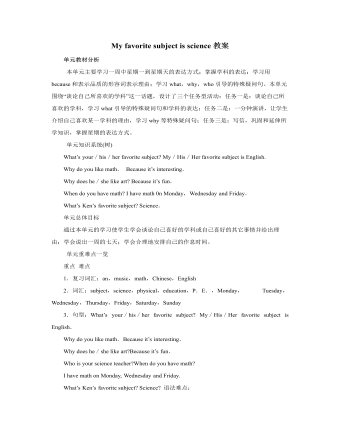
人教版新目标初中英语七年级上册My favorite subject is science教案
本单元主要学习一周中星期一到星期天的表达方式;掌握学科的表达;学习用because和表示品质的形容词表示理由;学习what,why,who引导的特殊疑问句。本单元围绕“谈论自己所喜欢的学科”这一话题,设计了三个任务型活动:任务一是:谈论自己所喜欢的学科,学习what引导的特殊疑问句和学科的表达;任务二是:一分钟演讲,让学生介绍自己喜欢某一学科的理由,学习why等特殊疑问句;任务三是:写信,巩固和延伸所学知识,掌握星期的表达方式。单元知识系统(树)What’s your/his/her favorite subject? My/His/Her favorite subject is English.Why do you like math. Because it’s interesting.Why does he/she like art? Because it’s fun.When do you have math? I have math 0n Monday,Wednesday and Friday.What’s Ken’s favorite subject? Science.单元总体目标通过本单元的学习使学生学会谈论自己喜好的学科或自己喜好的其它事情并给出理由;学会说出一周的七天;学会合理地安排自己的作息时间。

人教版新目标初中英语七年级下册How was your weekend教案2篇
Teaching Goal:1. General aims:Talk about recent past events2. Particular aims:A. Language Focus.Talk about recent past events and think of the past events.B. Language goalsHow was….?It was …What did …do over the weekend?C. Language structures:(1). How was your weekend? I was great. Pay attention to no form.(2). What did you do over the weekend? I played soccer. We went to the beach.D. Useful words and phrases:Words: was, did, went, beach, over, project, test, wasn’t, false, number, geography, spend, week, most, mixture, their, had, little, cook, read, saw, change, everyone, sit, sat, no, anythingPhrases: did one’s homework, played soccer, cleaned my room, went to the beach, played tennis, went to the movies, on Saturday morning, over the weekend, cook … for, what about, do some reading, have a party, talk show, go shoppingE. Grammar language:Present simple past tenseRegular and irregular verbsF. Learning strategies:Tour and holidaysG. Interdiscipinary:H. Emotion and manner:Teaching time: 5 periodsTeaching procedures:Period One教学步骤、时间 教师活动 学生活动 媒体应用Step 1Free talk 3’ Ask some questions like:Who’s on duty today?What’s the weather like? Answer and talk about something.让同学们回答下列问题1. Do you like weekend? (Let some students answer)It takes them three minutes to talk about the question.2. Why do you like weekend? (let the students answer) Most of the students like the weekend此时教师用汉语问:“在周末期间问你干了什么?这句话用英语这么回答?Let the students guess.At last the teacher give them right answer3. What did you do over the weekend?(板书、学习)

人教版新目标初中英语七年级下册Where is the post office教案2篇
Period 2 (3a----Section B 2c)Preview(Pre-task): Key points: What laAdd another information about their pen pals----their language on the cardnguage does she/he speak?She/He speaks....Does she/he have any brothers and sisters? Does she/he speak English?Preview(Pre-task): Add another information about their pen pals----their language on the cardKey points: What language does she/he speak?She/He speaks....Does she/he have any brothers and sisters? Does she/he speak English?Step 1 Revision1.Revisionand dictation of the new words 2.Revise the drills they learned yesterday.(by pairwork and grammar exercise)Step 2 Leading-inT has a conversation with one student. The conversation is following:---Do you have a pen pal?---Yes, I do.---What's your pen pal's name? ---His/Her name is....---Where is your pen pal from? ---He/She is from...---Where does he/she live? ---He/She lives in....---What language does he/she speak?He/She speaks...Write the new words on the Bb. They are following: EnglishChineseJapaneseFrenchStep 3 LearnLearn the new words with the whole class.Finish 3a with the students3b Pairwork T still does an example with one student Then the Ss practise in pairs. The example is following:--Curry Muray is my pen pal. He is from the United States.---What language does he speak?

人教版新目标初中英语七年级下册I want to be an actor教案2篇
三、教学建议第一课时:1. Lead in (Vocabulary)A) Before class, teacher should collect some pictures of working places. For example: Bank, TV Station, Restaurant, Police Station, Hospital ...B) In class, show students the pictures (PowerPoint, OHP). Ask students to tell the name of the working places and the name of the jobs.Shop assistant, doctor, actor, reporter, police office, waiter, bank clerk, studentC) Do exercise 1a and 3a.2. Bingo GameAsk groups of students to make up pairs of cards with a job on one and the related workplace on the other. For example, waiter / restaurant, teacher / school, doctor / hospital. Encourage students to use both the job / workplace combinations in the book and the ones that students came up during class discussions. Be sure they have twice as many sets of cards as there are students in the group. They can make two sets of cards for a single job / workplace, if necessary. Then have each group mix up its set of cards and hand their cards out in random order. Each time a student gets a pair of cards that match, he or she can lay these cards down. The goal is to have no cards in your hand at the end.3. Task OneA) Ask students to work in pairs and ask the partner what does he / she want to be in the future.e. g. :What do you / does he / does she want to be?I want to be a.Why?Because it's (adj).B) Vocabulary: Section B, 1a4. Homework 1.2.
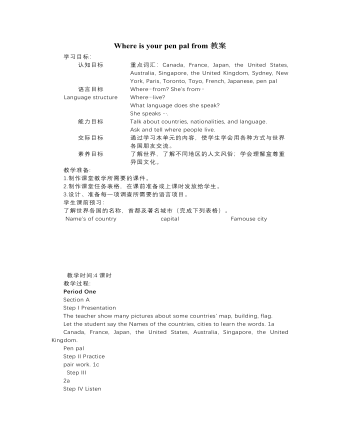
人教版新目标初中英语七年级下册Where is your pen pal from教案
2.1Match the country with the language.Step II Reading3a? let the students read the letter fast and answer the questions.? Let the students ask more questions about the letter as possible as the can.Step III Writing3b.Step IV. Pairwork2cStep V Listening2a, 2bStep V. HomeworkExercises book(1) P3Exercises book (2) P3Period FourStep I . Dictate the words and sentences in Unit1.Step II. Self-checkStep III. Check the answers for Exercises book in the unit.Step IV. Home workRevise and preparation for unit 2.教学反思:通过本单元的学习,学生基本可以谈论人们的国籍,居住城市及其所说的语言,通过书信方式去介绍自己并寻找笔友。但在涉及到国外的一些城市时,学生对这方面的知识相对欠缺,能介绍的城市并不多,也反应出学生课前预习不充分,这跟学生学习条件也有关,大多数学生无法通过网络获取所需信息。因此,在以后的教学中要多指导学生通过计算机网络获取信息,拓宽知识面。
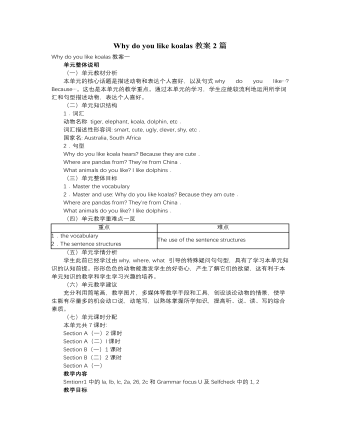
人教版新目标初中英语七年级下册Why do you like koalas教案2篇
单元整体说明(一)单元教材分析本单元的核心话题是描述动物和表达个人喜好,以及句式why do you like…? Because…。这也是本单元的教学重点。通过本单元的学习,学生应能较流利地运用所学词汇和句型描述动物,表达个人喜好。(二)单元知识结构1.词汇动物名称 tiger, elephant, koala, dolphin, etc.词汇描述性形容词: smart, cute, ugly, clever, shy, etc.国家名: Australia, South Africa2.句型Why do you like koala hears? Because they are cute.Where are pandas from? They're from China.What animals do you like? I like dolphins.(三)单元整体目标1.Master the vocabulary2.Master and use: Why do you like koalas? Because they am cute.Where are pandas from? They're from China.What animals do you like? I like dolphins.(四)单元教学重难点一览(五)单元学情分析学生此前已经学过由why, where, what 引导的特殊疑问句句型,具有了学习本单元知识的认知前提。形形色色的动物能激发学生的好奇心,产生了解它们的欲望,这有利于本单元知识的教学和学生学习兴趣的培养。
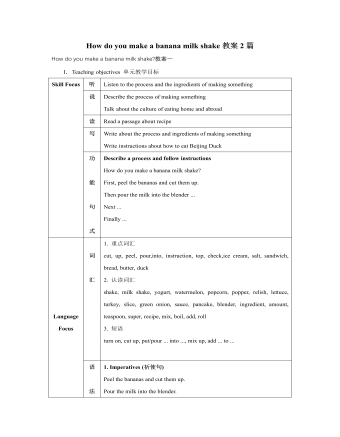
人教版新目标初中英语八年级上册How do you make a banana milk shake教案2篇
1. First, ... then, ... next, ... finally, ...首先,……然后,……接着,……最后,……这是英语中表达做某事的步骤的一种说法。如果步骤较多,还可以说:first-next-after that-later on-finally/at last通常你会听到说英语国家的人在说 first, next, then, finally 和后面的内容时,他们会做一些停顿。这样就能提前告诉听者接下来讲的是一系列的步骤。这一点在朗读和听力中应特别注意。2. how many, how much均为疑问词,同是“多少”,但用法不同。请看:how many修饰可数名词复数,how much修饰不可数名词。但在用法上,同学们常犯如下错误:1) [误] How many are there bananas on the table?[正] How many bananas are there on the table?[析] how many, how much 中的many,much是形容词,常修饰名词作定语,故后面跟名词。2) [误]How much tea are there on the table?[正]How much tea is there on the table?[析] how much修饰不可数名词时,谓语动词用单数。how many与how much的区别可简记为:前how many:问“多少”,复数名词后面跑;how much问“多少”,不可数名词单数好。前者答语用基数词,后者答语用数量关系。

人教版新目标初中英语八年级上册Could you please clean your room教案3篇
一、 教学内容Section A 1a----1c二、 教学目标1.学习词汇do the dishes, make the bed, take out the trash, fold the clothes, do the laundry, sweep the floor, clean the living room.2.句型 Could you please clean your room? Yes, sure.三、 教学准备 学生预习本单元所有的词汇多媒体课件 活动表 奖品四、 教学过程Pre-task1. Warming upEnjoy ourselves. Watch cartoon Cinderella. 看动画片段《灰姑娘》导如入本课话题和新词汇“chores”美丽善良的鬼姑娘因继母的嫉妒,每天得做所有的家务。片段的主题使学生联想到本课的话题。2. learn new words and phrasesLook! What is she / he dong? 看图学习动词词组do chores, do the dishes, make the bed, take out the trash, fold the clothes, do the laundry, clean the living room.3. Guessing game.What is she doing ? 4. Pair work. 1a, Do you do these things at home? Write “Y” for “yes” and “N” for “no”.5. Listening . 1b , Peter’s chores or Mom’s chores?理解目标语Could you please clean your room? Yes, sure.Write “M” for Mom’s chores, “P” for Peter’s chores in the chart.6. PairworkLook at the picture,Ask your partner to do the chores that you see. 7. Interview Who is the most able at home? 1) What chores do you do at home? How often do you do the chores? Work in four, interview each of the students in the group, fill in the chart.
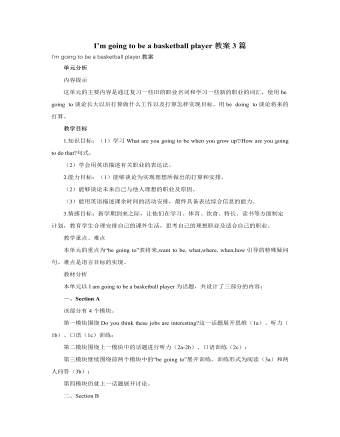
人教版新目标初中英语八年级上册I’m going to be a basketball player教案3篇
教学目标1.知识目标:(1)学习What are you going to be when you grow up?/How are you going to do that?句式。(2)学会用英语描述有关职业的表达法。2.能力目标:(1)能够谈论为实现理想所做出的打算和安排。(2)能够谈论未来自己与他人理想的职业及原因。(3)能用英语描述课余时间的活动安排,最终具备表达综合信息的能力。3.情感目标:新学期到来之际,让他们在学习、体育、饮食、特长、读书等方面制定计划,教育学生合理安排自己的课外生活,思考自己的理想职业及适合自己的职业。教学重点、难点本单元的重点为“be going to”表将来,want to be, what,where, when,how引导的特殊疑问句。难点是语言目标的实现。教材分析本单元以I am going to be a basketball player为话题,共设计了三部分的内容:一、Section A该部分有4个模块。第一模块围绕Do you think these jobs are interesting?这一话题展开思维(1a)、听力(1b)、口语(1c)训练;
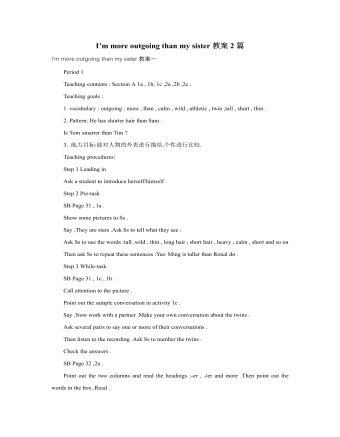
人教版新目标初中英语八年级上册I’m more outgoing than my sister教案2篇
1 交通工具的比较此活动为小组活动。学生通过讨论找出到达某一城市可乘坐的各种交通工具,并选择最佳出行方式。Teacher:We’re going to Shanghai. How many ways can we use to get there? Yes, there are four ways: by bus, by plane, by train, by ship. Please discuss how you are going to get there.操作建议:(1)学生以小组为单位展开活动,谈论本组所选择的交通工具。(2)各组选代表向全班汇报,阐述本组所选择的交通工具的利和弊。完成任务所需要的语言结构:We can go there by ship. It’s more comfortable and cheaper than any other transportation.We can go there by bus. It’s cheaper but it takes longer time.2 哪个城市更合适?此活动具有挑战性。假设中国要举行2014年世界杯足球赛,分别从历史,人文,天气等方面对各城市(北京,大连,上海,昆明)进行比较,选择最佳举办城市。T: Imagine China is holding the 2014 FIFA World Cup. Which city do you think is the best for the World Cup, Beijing, Dalian, Shanghai or Kunming? Let’s work in groups. If you choose Beijing, please join the Team Red. If you chose Dalian, please join the Team White. If you choose Shanghai, please join the Team Blue. If you choose Kunming, please join the Team Green. Please show us its advantages. Then let’s see which team will win.

人教版新目标初中英语八年级下册It’s a nice day, isn’t it教案2篇
"Hello! Welcome to English class! Introduce yourself. Meet your new classmates." That's what the teacher says. What do you say? "Oh no!" It can be difficult talking to new people. But it can be fun, and you can make friends. How do you do it? Make small talk. Small talk is polite conversation. "Wang Nan is a great pingpang player, isn't she?" "I'd love to meet her, wouldn't you?" "It's been raining a lot, hasn't it?" Tag questions are a form of polite speech. To make small talk successfully, you should know how to make them. You should also know what topics to talk about. Try to learn this unit carefully. The next time you're in English class, you'll find out. Making small talk's easy, isn't it? (“你好!欢迎你!请做一下自我介绍。认识一下你的新同学。”通常在课上老师会这样说。你会说什么呢?“噢,不!”与陌生人谈话太困难了。但是这也很有意思,并且你还能交到朋友。你该怎么做呢?闲聊。闲聊指得是礼貌的对话。“王楠是一个很棒的乒乓球运动员,不是吗?”“我希望自己能认识她,你呢?“今年的雨水很多,不是吗?”反意疑问句是一种礼貌用语。为了使得谈话成功,你应该知道怎样去进行闲聊。你还应该知道与不同的人该谈论什么样的话题。认真的学习这个单元吧,下次在英语课上,你会发现与大家展开谈话是一件很容易的事情,不信我们来试试。)
